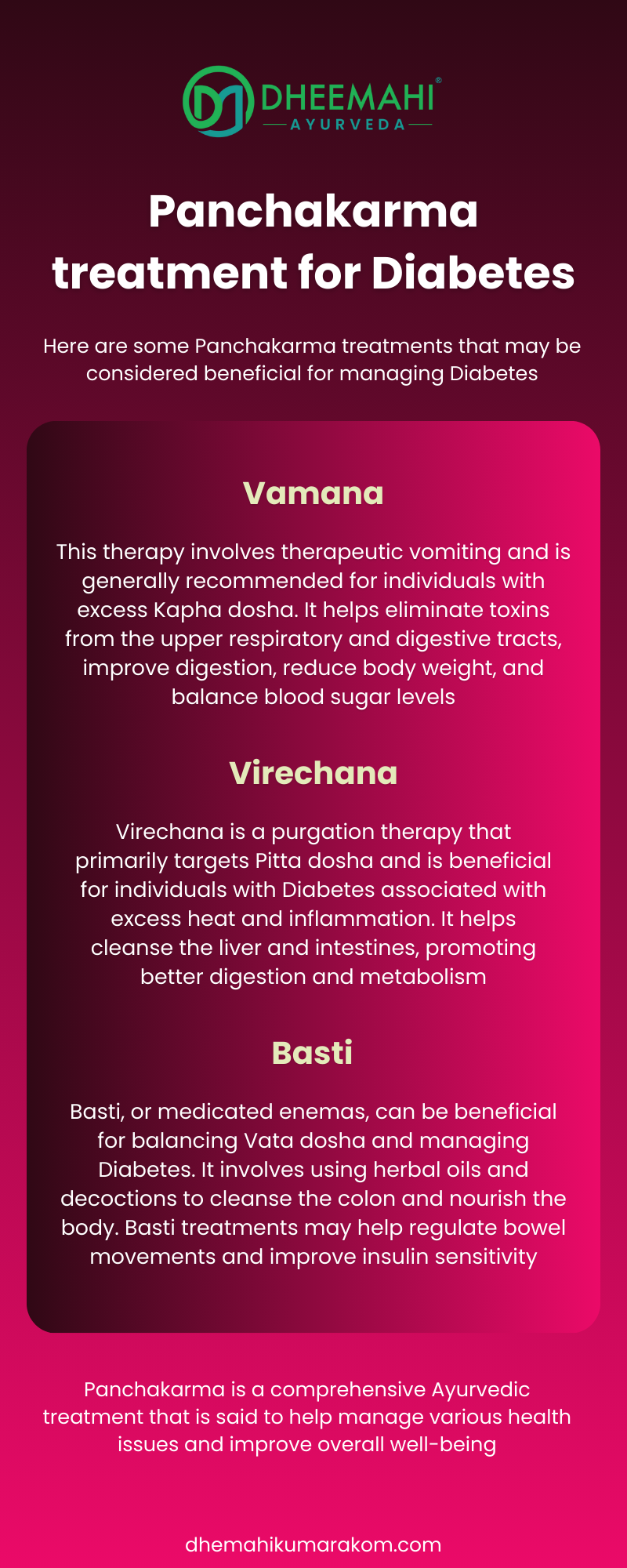What are the Ayurvedic Treatments for Diabetes?
Dr. Amritha B.A.M.S
Diabetes mellitus, commonly referred to as diabetes, is a chronic metabolic disorder characterised by elevated blood sugar levels.
In Ayurveda, diabetes is termed “Prameha,” stemming from imbalances in the body’s doshas—Vata, Pitta, and Kapha—resulting in impaired digestion and metabolism. The condition is believed to arise from genetic predisposition, poor lifestyle choices, and dietary habits that disrupt the body’s natural equilibrium.
Ayurvedic treatments for diabetes offer holistic approaches that address the root causes of the condition by restoring balance to the body’s systems through diet, herbs, detoxification, and lifestyle modifications.
Ayurvedic Treatments for Diabetes
Diabetes, a chronic metabolic disorder affecting millions worldwide, has garnered significant attention in both modern medicine and traditional healing practices like Ayurveda.
Ayurveda, rooted in ancient Indian wisdom, offers a holistic approach to managing Diabetes that integrates dietary adjustments, lifestyle modifications, and herbal remedies.
This comprehensive approach aims not only to control blood sugar levels but also to enhance overall well-being.
Dietary Guidelines: Ayurveda emphasizes a diet rich in whole grains, vegetables (especially bitter ones like bitter gourd), pulses, and moderate amounts of dairy. Foods that aggravate Kapha and Pitta, such as sweets and oily and fatty foods, must be avoided.
Lifestyle Modifications: Regular physical activity, yoga, and meditation are integral to managing Diabetes in Ayurveda. These practices help balance doshas, reduce stress, and improve insulin sensitivity.
Detoxification Therapies: Panchakarma, a series of purification therapies, is sometimes recommended to eliminate toxins (ama) believed to contribute to Diabetes.
According to Ayurveda, Prameha Chikitsa is classified into two categories based on the patient’s constitution:
- Sthula Prameha (Obese and Strong):
Treatment: Shodhana Chikitsa (Elimination Therapy)
Therapies: Snehanam (Oleation Therapy) and Vamanam/Virechana (Emetic/Purgative Therapy)
- Karshya Prameha (Emaciated and Weak):
Treatment: Rasayana Chikitsa (Nourishing Therapy)
Therapies: Snehanam (Oleation Therapy) and Sodhanam (Purification Therapy)
The specific Panchakarma treatment for Diabetes is an Ayurvedic treatment that can vary depending on an individual’s constitution (Prakriti), current imbalances (Vikriti), and overall health status. Here are some Panchakarma treatments that may be considered beneficial for managing Diabetes:
Vamana: This therapy involves therapeutic vomiting and is generally recommended for individuals with excess Kapha dosha. It helps eliminate toxins from the upper respiratory and digestive tracts, improve digestion, reduce body weight, and balance blood sugar levels.
Virechana: Virechana is a purgation therapy that primarily targets Pitta dosha and is beneficial for individuals with Diabetes associated with excess heat and inflammation. It helps cleanse the liver and intestines, promoting better digestion and metabolism.
Basti: Basti, or medicated enemas, can be beneficial for balancing Vata dosha and managing Diabetes. It involves using herbal oils and decoctions to cleanse the colon and nourish the body. Basti treatments may help regulate bowel movements and improve insulin sensitivity.
Panchakarma is a comprehensive Ayurvedic treatment that is said to help manage various health issues and improve overall well-being. It is a therapy procedure that aims to detoxify the body. Depending on the processes chosen by the Ayurvedic practitioner, the entire Panchakarma therapy takes seven to fifteen days.
Which dosha causes diabetes?
Ayurveda has a unique classification of the human population based on the individual constitution or Prakriti. The Tridosha theory of Ayurveda recognizes principles of movement (Vata), metabolism (Pitta), and strength (Kapha) as distinct phenotypic groupings.
As per this system, every individual is born with their basic constitution, which determines to a great extent inter-individual variability in susceptibility to diseases and response to the external environment, diet, and drugs. According to Ayurveda, there are five elements (panchmahabhoot): Aakash (space), Jala (water), Agni (fire), Prithvi (earth), and Vayu (air); its combination is responsible for the formation of dosha, i.e., Vata (air and space), Pitta (fire and water), Kapha (water and earth). Because dosha balance is a sign of good health and imbalance is a sign of disease, each person’s dosha proportion differs.
According to Ayurveda, the manifestation of diabetes occurs due to Kapha’s predominant diet, such as sweets, curd, newly harvested grains, etc. As a result, the knowledge of patients’ dominant Dosha Prakriti aids in diagnosing, prognosis, and treating their disease.
Ayurveda describes DM under non-insulin-dependent DM as Kaphaj and Pittaj Prameha; it represents early diabetes and acute diabetes. Based on complications associated with the chronic stage of the disease, the same T2DM condition is termed Vataja Prameha/Madhumeha. Similarly, insulin-dependent DM has also been defined under Vataja Prameha. Prakriti types exhibit striking differences in biochemical and haematological parameters.
What are the symptoms of diabetes?
Increased Thirst and Urination
One of the hallmark signs of diabetes is polyuria (excessive urination) and polydipsia (excessive thirst). Elevated blood glucose levels lead to increased urine production as the kidneys work to eliminate the excess sugar from the body. This, in turn, triggers dehydration and heightened thirst.
Persistent Hunger
Despite eating regularly, individuals with diabetes may experience persistent hunger (polyphagia). This occurs when cells cannot absorb glucose effectively due to insulin resistance or insufficient insulin production, leading to constant hunger.
Unexplained Weight Loss
Unintentional weight loss can be a sign of diabetes, particularly in type 1 diabetes, where the body fails to utilize glucose properly and begins to break down fat and muscle tissue for energy. In type 2 diabetes, weight loss may occur due to increased urination and loss of calories in the urine.
Fatigue
Feelings of tiredness and fatigue are common in diabetes, stemming from the body’s inability to convert glucose into energy efficiently. Insufficient cell energy production, compounded by dehydration and disrupted sleep due to frequent urination, contributes to persistent fatigue.
Slow Healing of Wounds
High blood sugar levels impair circulation and compromise the immune system’s ability to heal wounds effectively. Minor cuts and bruises may take longer to heal in individuals with diabetes, increasing the risk of infections and other complications.
Blurred Vision
Fluctuating blood sugar levels can cause temporary changes in the shape of the eye’s lens, leading to blurred vision. This symptom typically resolves once blood sugar levels are stabilized, but it serves as an essential indicator of uncontrolled diabetes.
Numbness or Tingling in Extremities
Diabetic neuropathy, nerve damage resulting from prolonged high blood sugar levels, often manifests as numbness, tingling, or pain in the hands and feet. This condition develops gradually and can lead to loss of sensation and coordination if left untreated.
Recurrent Infections
High blood sugar levels impair the immune system’s ability to fight infections, making individuals with diabetes more susceptible to frequent infections, particularly urinary tract infections, skin infections, and yeast infections.
Diabetes Ayurvedic Treatments at Dheemahi
At Dheemahi, we offer a comprehensive Ayurvedic approach to managing diabetes. We combine ancient wisdom with modern science to promote holistic healing and improve quality of life. Our approach is not just about treating the symptoms, but about empowering individuals to manage their condition effectively and achieve optimal health. Experience the benefits of Diabetes Ayurvedic Treatment in Kerala and take control of your health journey with us.
We do this by addressing the root causes of diabetes through personalized treatments, diet modifications, herbal remedies, and supportive therapies like Panchakarma and yoga. This personalized approach, which begins with a thorough assessment of the patient’s doshic constitution (Prakriti) and the specific imbalance causing their diabetes, ensures that treatments are tailored to individual needs, enhancing effectiveness and outcomes.
Ayurvedic herbs play a significant role in managing diabetes at Dheemahi. Herbal formulations tailored to individual needs are prescribed to enhance pancreatic function, improve insulin production, and regulate blood sugar levels.
Yoga and meditation are integral components of Ayurvedic treatment at Dheemahi. They promote physical fitness, mental clarity, and emotional balance. Yoga postures (asanas), breathing exercises (pranayama), and meditation techniques are tailored to individual needs, helping manage stress, improve circulation, and support overall well-being.
Continuous monitoring of blood sugar levels and overall health is conducted at Dheemahi to assess the effectiveness of treatment and make necessary adjustments. Patients receive ongoing support and guidance to maintain positive lifestyle changes and sustain improvements in their diabetes management.
How Our Booking Process Works
The unique approach involves a series of discussion during your initial decision-making process to make sure that we will be able to match your expectations with our treatment.
Based on the discussions with you our team of expert doctors will design the best treatment package personalized for your needs.
01
Consultation Form
Fill out our consultation form, and let us know when will you be available for our doctor to talk to you
02
Discussion with Doctor
Discuss your health condition and expectations with our doctor.
03
Booking Confirmation
Confirm the booking by making a payment of 50% advance.
Consultation Form
Submit this form to initiate a booking with us
Have any queries? We will help you. Talk to us now
Say Goodbye to Health Woes & Hello to Healthy Living
Dheemahi Ayurvedic Pvt Ltd
12/386 Varaputhara Road
Kumarakom, Kerala, India
Pin 686563
Dheemahi Ayurvedic Centre, Near Neelimangalam Bridge, Kumaranaloor, Perumbaikad.P.O, Kottayam, Kerala, India, Pin 686016
Other Treatments
Karkidaka Chikilsa | Ayurvedic Treatment for Depression | How to Reduce Stress Naturally | Autoimmune Disorders | Mental Health Ayurvedic Treatment | Weight-Loss Treatment | Frozen Shoulder Ayurvedic Treatment | Diabetes Ayurvedic Treatment | PCOS Ayurvedic Treatment | Celiac Disease Treatment | ayurvedic treatment for skin diseases | nervous system ayurvedic treatment | Back Pain Ayurvedic Treatment | Cervical Spondylitis Ayurvedic Treatment | ayurvedic treatment for blood sugar | Fatty Liver Ayurvedic Treatment | Knee Pain Ayurvedic Treatment | Migraine Ayurvedic Treatment | Osteoarthritis Ayurvedic Treatment | Psoriasis Ayurvedic Treatment | Sinusitis Ayurvedic Treatment | Ayurvedic Detox Treatment | Migraine Ayurvedic Treatment | Ayurvedic Treatment for Rheumatoid Arthritis | Ayurvedic treatment for joint pain | Ayurvedic treatment for ulcerative colitis | Panchakarma Treatment |


